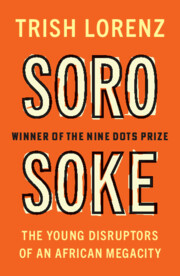‘My party, the Progressive People’s Congress, despite being a new party founded on a strong political ideology, did not win a single seat, largely due to financial constraints and its unwillingness to play outside the rules of the game.’
‘I belong to a society that sees youth as the leaders of tomorrow, not of today. Rather than encourage youth involvement in politics and nation building, the older generation sees us as tools that can be used to foster their interests and achieve their political goals. This phenomenon has, over time, disempowered the most active and vibrant population in our society.
Contesting the 2019 governorship was an eye-opener for me. I became aware of the intrigues involved in winning an election as well as the humongous amount of money needed throughout the electioneering period. Presently in Nigeria there are two major political parties, and these two parties control the dynamics of who wins what. So, contesting an election outside these two parties poses great challenge. My party, the Progressive People’s Congress, despite being founded on a strong political ideology, did not win a single seat, largely due to financial constraints and its unwillingness to play outside the rules of the game.
Inadequate funding posed the greatest challenge. Winning an election in Nigeria is capital intensive. There are financial benchmarks set by the country’s election umpire but the major political parties and their candidates are known to spend way beyond these, thereby significantly narrowing the chances of the smaller political parties. Unfortunately, none of our candidates, including myself, could match the financial fire power of our opponents and our best efforts and ideas were scuttled due to lack of funding. Not many people were willing to pay attention to our manifesto once it was obvious we weren’t going to dole out cash after each campaign. So, to a large extent, the election was lost even before the first vote was cast.

Figure 37 Fortunes Paul Okoronkwo, 39, contested the governorship election in his home state of Abia for the Progressive People’s Congress in 2019
There is also a high cost to securing nomination forms, especially for the major parties. To get on these parties’ nomination forms, an aspirant must be rich. Since not many youths can afford it, contesting on the platforms of relatively unknown political parties becomes the only option for people like me. Even to secure my party’s governorship nomination form, I paid a quarter of a million naira (approx US$600).
In the end, I emerged as the sole candidate from my party for the governorship and came fifth out of the 31 candidates that contested the election. It was not a bad start, the financial and cultural challenges notwithstanding.
In hindsight, I will say my biggest achievement has been learning that it takes creativity, ingenuity and a sense of mission and purpose to contest an election as a young person and to remain in the race till the end. I have also learnt that young people seeking elective positions must stay true to their guiding principles. Without that it is quite easy to either get discouraged or get influenced to join the bandwagon of politrickians.’


